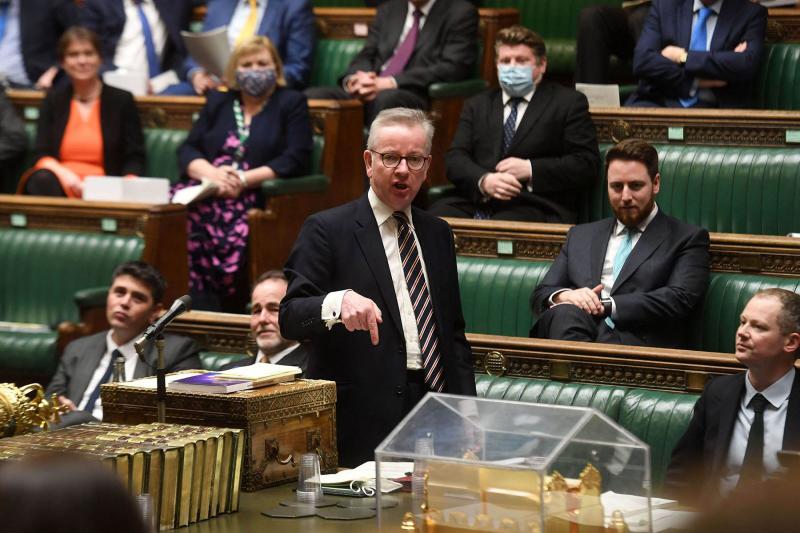The British government announced a new official definition of “extremism” on Thursday, putting the Muslim Brotherhood on top of its list of organisations of concern.
The move, which triggered expressions of concern from rights groups, was in response to a surge in reports of anti-Semitism and anti-Muslim hate speech and what authorities call an increase in radicalisation in Britain since Hamas’ October 7 attack on Israel, which triggered the war and Israel’s invasion of Gaza.
Speaking to parliament, Communities Secretary Michael Gove pointed in particular to threats from the extreme right and Islamic “extremists who are seeking to separate Muslims from the rest of society and create division within Muslim communities.”
“We are in no way intending to restrict freedom of expression, religion or belief, but the government cannot be in a position where, unwittingly or not, we sponsor, subsidise or support in any way organisations or individuals opposed to the freedoms we hold dear,” Gove told lawmakers.
Groups that raise concerns under the new definition include the Muslim Association of Britain (MAB), which is UK affiliate of the Muslim Brotherhood, as well as the British National Socialist Movement, a neo-Nazi organisation, and Gove said.
Gove told MPs: “Organisations such as the Muslim Association of Britain, which is the British affiliate of the Muslim Brotherhood, and other groups such as Cage and Mend give rise to concern for their Islamist orientation and beliefs. We will be holding these and other organisations to account to assess if they meet our definition of extremism, and will take action as appropriate.”
Experts of political Islam say that the new definition will theoretically curtail the activities of the Muslim Brotherhood, reducing it influence on Muslim communities and their ability to promote extremist ideas. Such ideas, they say, surfaced during recent demonstrations against the war in Gaza.
The experts are however sceptical the announcement of the new definition will lead to a new comprehensive approach by the British government in dealing with radical Islamist groups based in the UK. They believe that a more selective approach based on assessment of British interests is more likely.
Egyptian expert on terrorist groups, Tariq Abu Al-Saad, told The Arab Weekly: “Britain faces a two-fold crisis. It wants on the one hand to preserve its principles of protecting freedom of expression and liberal values, while it suffers on the other hand from the effects of the activities of Islamist groups and those of the far right which use these values to spread their ideas and translate them into hostility against others. This has created a potentially explosive situation.”
He added that “silence about the Muslim Brotherhood’s activities under the pretext of allowing freedom of expression has restricted Britain’s ability to curb extremism and pursue counter-extremism, while the threat rose after the outbreak of the war on the Gaza Strip.”
Authorities are expected to publish a list of organisations of concern in coming weeks. The new guidelines would not yet criminalise or ban the groups.
Anti-Semitic incidents rose by 147 percent in 2023 to record levels, especially after the October 7 attacks, according to Community Security Trust, a Jewish safety watchdog. Tell Mama, a group which monitors anti-Muslim incidents, said last month that anti-Muslim hate crimes also had grown by 335 percent since the attacks.
“Our democracy and our values of inclusivity and tolerance are under challenge from extremist groups, which are radicalising our young people and driving greater polarisation,” said Gove, who heads the department that produced the new extremism definition.
This definition states that extremism “is the promotion or advancement of an ideology based on violence, hatred or intolerance” that aims to destroy fundamental rights and freedoms; or undermine or replace the UK’s liberal parliamentary democracy; or intentionally create an environment for others to achieve those results.
Britain already bans groups which it says are involved in terrorism, and supporting or being a member of these organisations is a criminal offence. The militant Palestinian group Hamas is among the 80 proscribed international organisations.
Groups identified as extremist following assessment over the next few weeks will not be subject to any action under criminal laws and will still be permitted to hold demonstrations.
But the government will not provide them with any funding nor other form of engagement. Currently, no groups have been officially defined as extremist using the former definition which has been in place since 2011.
The Muslim Council of Britain warned that the proposals were “undemocratic, divisive and potentially illegal” and “may involve defining established Muslim organisations as extremist.”
“With elections looming, it’s unsurprising that the government is resorting to this desperate tactic in the culture war,” said Zara Mohammed, the group’s secretary general.
The announcement comes two weeks after Prime Minister Rishi Sunak made a rare televised speech outside 10 Downing Street to denounce “a shocking increase in extremist disruption and criminality,” which he linked to the Israel-Hamas war.
Mass pro-Palestinian protests have drawn hundreds of thousands of people to central London to call for a cease-fire. The protests have been overwhelmingly peaceful, though there have been dozens of arrests over signs and chants that police say showed support for the militant Hamas group, a banned organisation in Britain. Police also arrested some right-wing counter-protesters and charged them with inciting racial hatred.
Jewish organisations and many lawmakers said the mass marches have created an intimidating atmosphere for Jewish Londoners, though members of the Jewish community have been among those on pro-cease-fire marches.
Yasmine Ahmed, UK Director of Human Rights Watch, said: “This unnecessary and unacceptable new definition is little more than the government’s latest attempt to silence criticism and impede our democratic freedoms, like freedom of speech and the right to assembly.”

